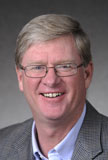
New Annals Editor Kevin Masters Focuses on Honesty, Interventions
Lindsay Bullock, SBM senior media and member communications manager
To say Kevin Masters is a busy man would be an understatement.

Kevin Masters
Masters, PhD, serves as program director for the clinical health psychology doctoral training program at the University of Colorado Denver. He teaches classes there. He does research on how religion and cardiovascular health intersect. He is the immediate past-president of the American Psychological Association’s Division 38. And, in October, he also started work as editor-in-chief of the Society of Behavioral Medicine’s Annals of Behavioral Medicine.
It’s a lot, but Masters said he’ll make plenty of time for Annals because the job is such a critical one.
“Being an editor is a really important job,” he said, “because the lifeblood of our science, in fact the basis of our knowledge, is peer-reviewed publication.”
Masters brings that sense of dedication to the job. He also brings an innate frankness and a desire to publish manuscripts that focus on health interventions.
Masters’ frankness comes out in his dealings with authors. He has no qualms about telling them a piece won’t work, and he makes a point to do so right after the piece is submitted instead of after a lengthy editorial review process. He learned to do that as editor-in-chief of the Journal of Behavioral Medicine, a position he’ll vacate December 31.
“When I first started I was very reluctant to do that with any manuscript,” he said, “but you do get to a point where you can kind of sense [when] a manuscript really won’t make it through the process. And at some point it becomes unfair to the authors if you send it out and take three to four months getting a review on a manuscript you knew wasn’t going to make it. Plus it wears out your reviewers and your editors.”
Masters’ up-front approach has gotten him thank-you emails from authors whose work he rejected. They appreciated his fairness and timeliness, he said.
“It’s better for the authors to move that manuscript forward to another publication more quickly,” he explained.
When Masters considers manuscripts for publication in Annals, he will be especially looking for ones that emphasize potential interventions. He said he’s read more than enough manuscripts about the likelihood of certain people to behave certain ways.
“We’ve seen tons of studies [like that]. We’ve got it. We don’t need to hear it again,” he said. “Instead, show me an intervention. What are you going to do about it?”
Masters tries to follow that prompt in his own work. He started his psychology career with interests in religion and mental health. He studied with Allen E. Bergin at Brigham Young University in Provo, UT, before eventually heading to Duke University in Durham, NC. There, in the Bible Belt, Masters paired his interest in religion with a newer interest in cardiology. Most recently, as program director for the clinical health psychology doctoral training program at the University of Colorado Denver, Masters has been studying religion as a form of culture.
“In that sense, you can study practices within those cultures and see what impacts they have on cardiovascular function,” he said.
For instance, Masters found Christians who took part in Christian prayer rather than secular meditation were less reactive in terms of blood pressure and heart rate when engaged in a subsequent conversation that challenged some of the core beliefs of their faith.
“That suggests to us, if you extrapolate wildly, that maybe you could go into a church and work with that subculture to develop interventions that would help people manage their anger and perhaps help manage cardiovascular activity and health,” he said. “We think this is an important public health issue because, depending on whose stats you believe, anywhere from 20-40% of Americans are in church or synagogue every weekend. That’s a lot of people in a captive situation where they’re prone to believe what’s told to them, and it seems to me we could take better advantage of that than we have.”
Working on that—and editing Annals—is sure to keep Masters busy.
Kevin Masters, the incoming Annals of Behavioral Medicine editor-in-chief, gives the presidential address at the American Psychological Association Division 38 annual convention in August 2014. Masters is now the Division 38 immediate past-president.